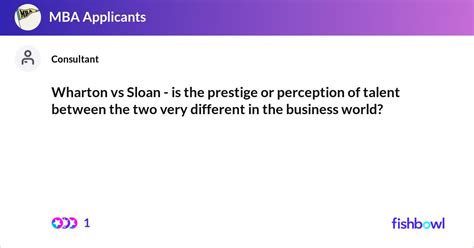Introduction

When it comes to business education, two names stand out: Wharton and Sloan. Both schools are renowned for their academic excellence, esteemed faculty, and impressive alumni networks. But which school is the right fit for you? This comprehensive guide will delve into the unique attributes, strengths, and challenges of Wharton and Sloan, helping you make an informed decision.
Key Differences: Wharton and Sloan
| Feature | Wharton | Sloan |
|---|---|---|
| Location | Philadelphia, Pennsylvania | Cambridge, Massachusetts |
| Founded | 1881 | 1914 |
| Class Size | ~880 MBA students | ~600 MBA students |
| Curriculum | Core curriculum with extensive electives | More flexible curriculum |
| Research Focus | Finance, economics, marketing | Management, entrepreneurship, healthcare |
| Campus Culture | Traditional and social | Collaborative and international |
| Application Deadline | October 15 | January 5 |
Wharton: The Powerhouse of Business
Academics:
Wharton boasts a robust academic program that emphasizes financial analysis, data analytics, and strategic thinking. Its core curriculum covers essentials such as accounting, finance, marketing, and operations, while allowing students to tailor their studies through a wide range of electives.
Faculty:
Wharton’s faculty is composed of world-renowned scholars and industry experts. They are actively engaged in cutting-edge research and bring their insights and real-world experiences into the classroom.
Career Opportunities:
Wharton graduates are highly sought after by top employers in finance, consulting, tech, and other industries. The school’s strong alumni network provides valuable connections and career support.
Sloan: The Innovation Catalyst
Academics:
Sloan offers a more flexible curriculum that allows students to delve into their areas of interest while developing a broad foundation in business. The school’s Action Learning Labs and Immersion Experiences provide students with hands-on experience in addressing real-world business challenges.
Faculty:
Sloan’s faculty is known for their research and teaching excellence in management, entrepreneurship, and healthcare. They encourage students to think critically and collaborate effectively.
Career Opportunities:
Sloan graduates are well-equipped for careers in tech, healthcare, consulting, and entrepreneurship. The school’s close ties to Silicon Valley and Boston’s biotechnology sector provide students with access to cutting-edge industries.
Which School is Right for You?
The right business school depends on your individual goals, aspirations, and strengths.
Consider Wharton if you:
- Desire a rigorous academic experience with a focus on finance and data analytics
- Value a traditional campus culture and a strong alumni network
- Aim for careers in large corporations or financial institutions
Consider Sloan if you:
- Seek a flexible curriculum with hands-on learning opportunities
- Embrace innovation and entrepreneurship
- Aspire to work in tech, healthcare, or consulting
Common Pain Points: Wharton vs. Sloan
- Wharton: Large class size and high competition for internships and jobs
- Sloan: Higher cost of living in Boston and fewer traditional internships in finance
Motivations for Choosing Wharton or Sloan
- Wharton: Desire for a prestigious degree, access to top employers, and a strong alumni network
- Sloan: Interest in innovation, hands-on learning, and a flexible curriculum
Effective Strategies for Success at Wharton or Sloan
- Build a strong network through clubs, events, and alumni
- Seek out mentorship opportunities with faculty and industry professionals
- Develop strong analytical and communication skills
- Take advantage of on-campus resources such as career counseling and tutoring
- Maintain a healthy work-life balance and prioritize well-being
FAQs
1. Which school has a stronger alumni network?
Both Wharton and Sloan have strong alumni networks, but Wharton’s is larger and more established.
2. Which school is better for entrepreneurship?
Sloan is generally considered to be stronger in entrepreneurship due to its flexible curriculum and proximity to tech hubs.
3. Which school is more selective?
Wharton typically has a lower acceptance rate than Sloan.
4. Which school is better for international students?
Both Wharton and Sloan have a large and diverse international student population.
5. Which school is more expensive?
The cost of tuition and living expenses is comparable at both Wharton and Sloan.
6. Which school offers more financial aid?
Both Wharton and Sloan offer merit-based scholarships and need-based financial aid.
7. Which school is better for healthcare professions?
Sloan has a stronger focus on healthcare management and innovation.
8. Which school is better for tech careers?
Sloan has stronger ties to Silicon Valley and the tech industry.
Conclusion
The choice between Wharton and Sloan is a significant decision that requires careful consideration of your individual goals and aspirations. By weighing the unique strengths and challenges of each school, you can make an informed decision that will set you on the path to success. Whether you seek a rigorous academic experience with a strong financial foundation or a flexible and innovative program that fosters entrepreneurship and innovation, Wharton and Sloan offer exceptional opportunities for business education.
